
By Thomas Hauer, Jr.
Cryptocurrency giveaway scams have been a problem for those involved in the crypto-community since the last major bull run in late 2017. Whether you’re a seasoned investor or just beginning to get your feet wet in the crypto-space, we encourage all of our customers to educate themselves on current cryptocurrency related scams and how to identify them. In this article, we’ll cover an increasingly common technique used by online scammers — the giveaway scam.
In a nutshell, giveaway scams are a form of social engineering in which a scammer attempts to deceive a cryptocurrency investor into believing that a major cryptocurrency exchange or celebrity is hosting a giveaway. The catch here is that in order to participate in the giveaway, you must first send a certain amount of cryptocurrency to a giveaway address so that you can verify your wallet address and receive your share of the giveaway. However, because cryptocurrency transactions are irreversible, once a victim sends money to the scammer’s address, there is nothing anyone can do to get it back and the scammer has made a profit.
Now that you understand the gist of what giveaway scams are all about, we’d like to make it extremely clear that Coinbase does not engage in cryptocurrency giveaways of any kind, however you can earn cryptocurrency by learning about them through Coinbase Earn. With that said, let’s move on to some recent trends.
Recent Giveaway Scam Trends
To help you recognize the signs of a giveaway scam, we’ve provided you with some examples of the most common giveaway scam trends being used to target cryptocurrency investors.
Coinbase Twitter Impersonations
In the screenshot below, we have a Twitter account impersonating Coinbase and replying to a legitimate Coinbase tweet with an image promoting a 5,000 BTC giveaway scam.

The link in this image directs to a web page which would ask you to verify your Bitcoin address by sending anywhere from 0.1 to 10 BTC to the scammer’s giveaway address. According to the scammer’s web page, you would get x10 your payment back. This all sounds very good, but it is 100% a scam and you will receive 0 BTC back!
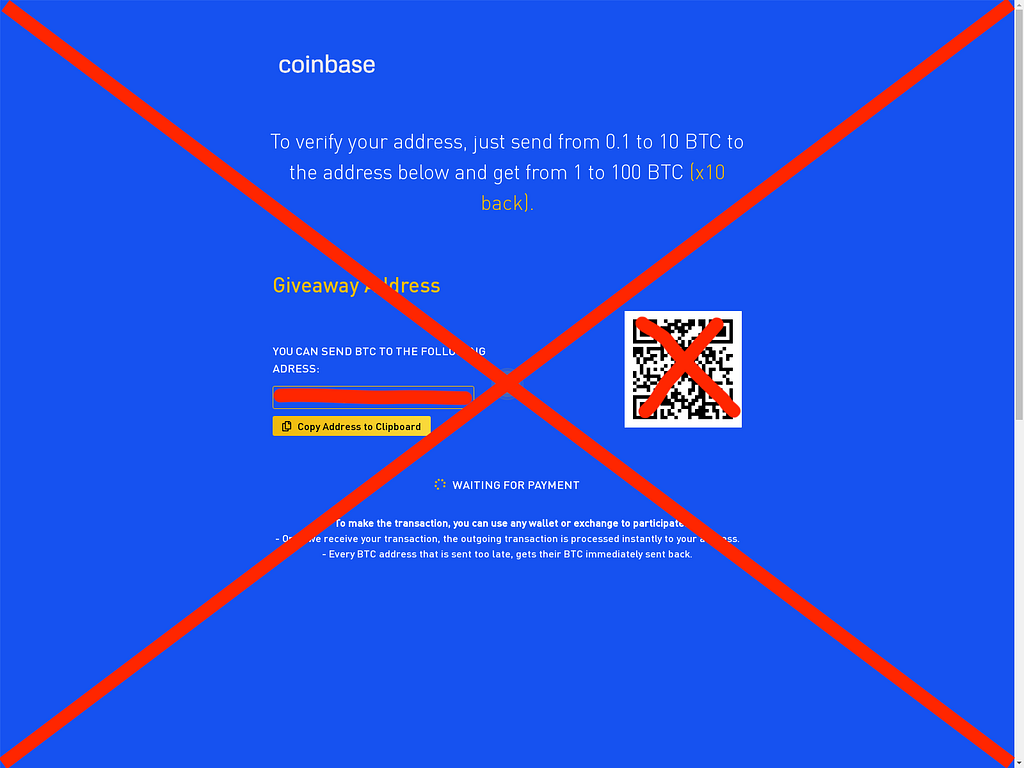
Celebrity Twitter Impersonations
In this example, we have a very normal looking Twitter account replying to a tweet made by Senator Bernie Sanders. The response here is thanking Elon Musk and sharing an image that appears to be a tweet from Elon Musk about a Bitcoin and Ethereum giveaway being hosted by Tesla. In actuality, this image was manipulated to appear like Elon Musk made this tweet and is purely manufactured by a scammer.

Navigating to the link in the scammer’s image lands us on a web page that appears to be a Medium blog post. Within the post there are two “official” links leading to “free” Bitcoin and Ethereum. Both of these links lead to scam giveaway addresses that are not to be trusted no matter how great and well designed the web page looks.
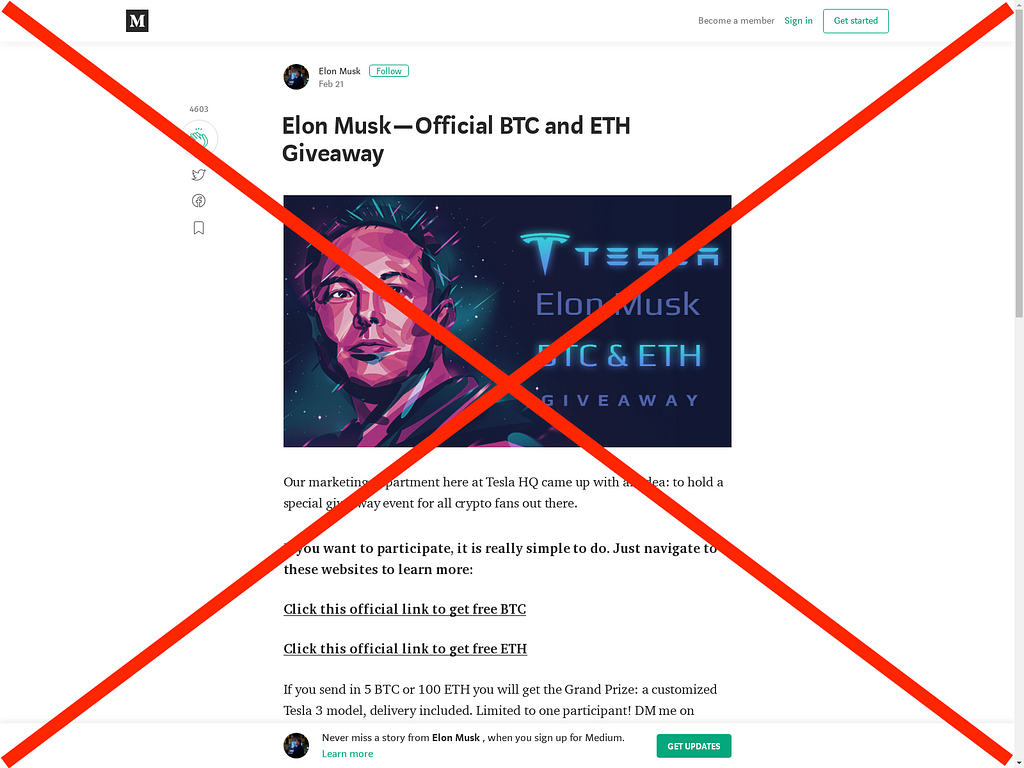
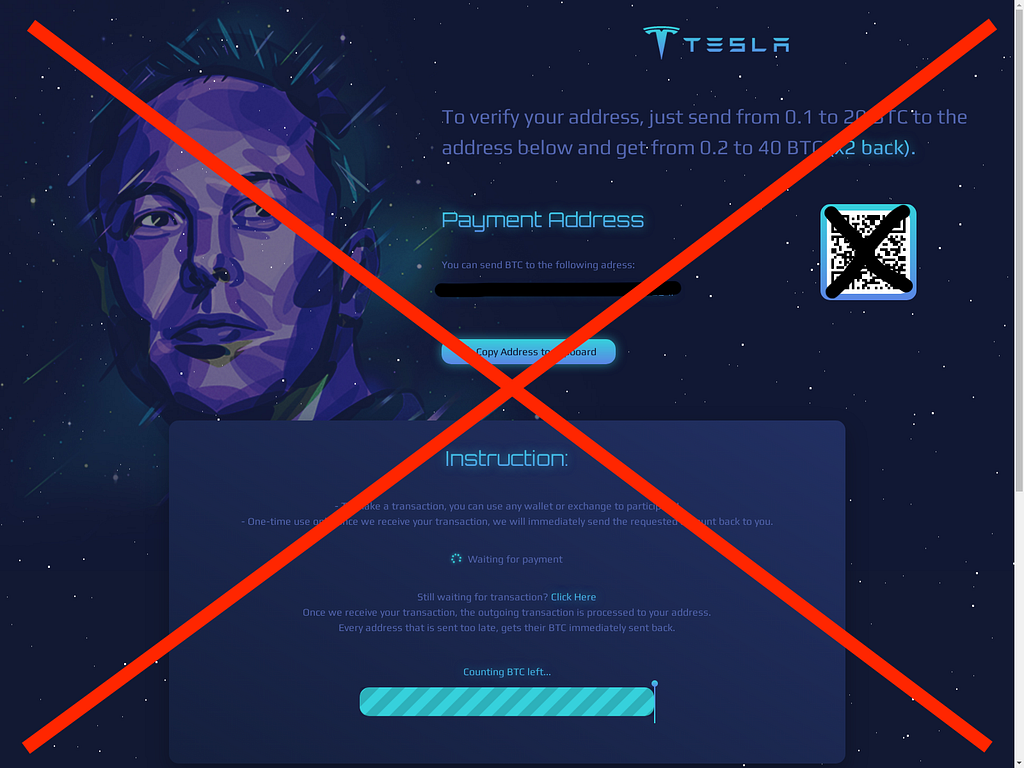
YouTube Live Streams
This is a fairly new technique that scammers have been using to perpetuate their cryptocurrency giveaway scams. In this example, the scammer will create a YouTube video using older video streams of cryptocurrency exchange CEOs and overlay the video with some details about an alleged giveaway. They will also set up the video as a live stream so that it appears to be something that is happening NOW, further enticing viewers to participate in the giveaway immediately. In the video description, there is often an “official” giveaway address or a link to a web page containing the giveaway address. Additionally, the scammer will drive fake viewers to the video to make it seem like they have thousands of viewers at that very moment. Don’t fall for this scam, it’s a trap and you will not receive any free BTC!
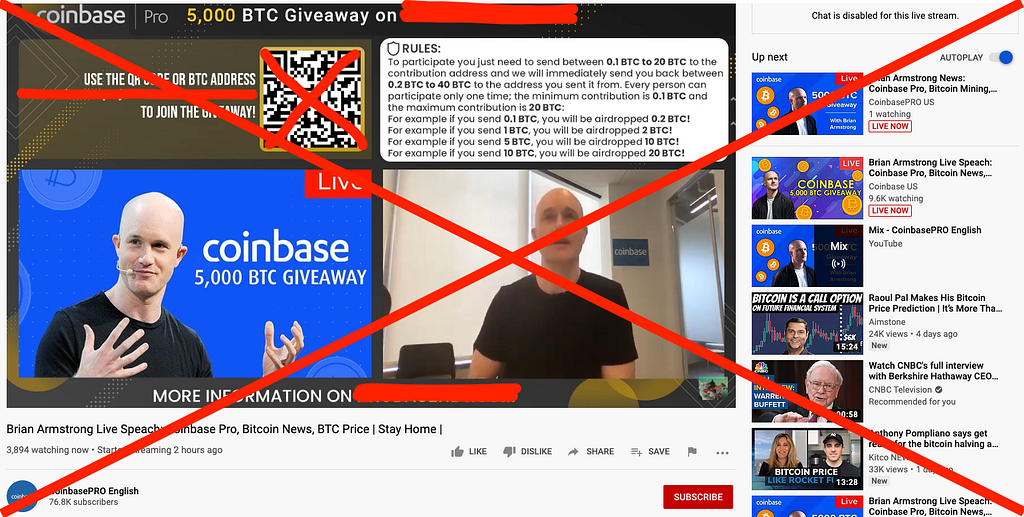
Giveaway Scam Email
In our final example, we have an attempt to promote a giveaway scam via email. In the email, the scammer is attempting to convince the recipient that Coinbase is hosting a giveaway to celebrate a user sign up milestone. As previously mentioned, Coinbase does not partake in any cryptocurrency giveaways. Therefore, this is a scam!
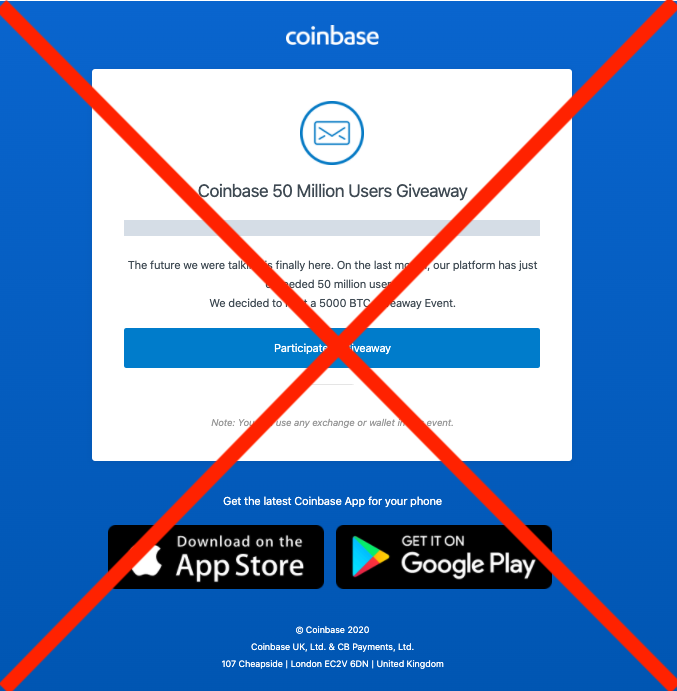
Protecting your investment and fellow investors
Now that you’ve learned about the latest techniques being used by giveaway scammers, there are two simple rules that we’d like you to remember that should help you avoid scams like these in the future:
- If it sounds too good to be true, it almost certainly is.
- Think twice before sending your funds. All cryptocurrency transactions are irreversible and you will not be able to get your money back.
Lastly, if you encounter any giveaway scams like the ones shown above, please take a moment to protect the broader cryptocurrency community by reporting the scam to Coinbase or directly to Twitter, YouTube, or Google. For your reference, we’ve provided information on reporting to each entity below.
Coinbase — Report via email to security@coinbase.com
Twitter — https://help.twitter.com/en/safety-and-security/report-abusive-behavior
YouTube — https://support.google.com/youtube/answer/2802027
Google SafeBrowsing — https://safebrowsing.google.com/safebrowsing/report_general/
Crypto giveaway scams and how to spot them was originally published in The Coinbase Blog on Medium, where people are continuing the conversation by highlighting and responding to this story.
via The Coinbase Blog - Medium https://blog.coinbase.com/crypto-giveaway-scams-and-how-to-spot-them-59e24d220616?source=rss----c114225aeaf7---4
No comments:
Post a Comment